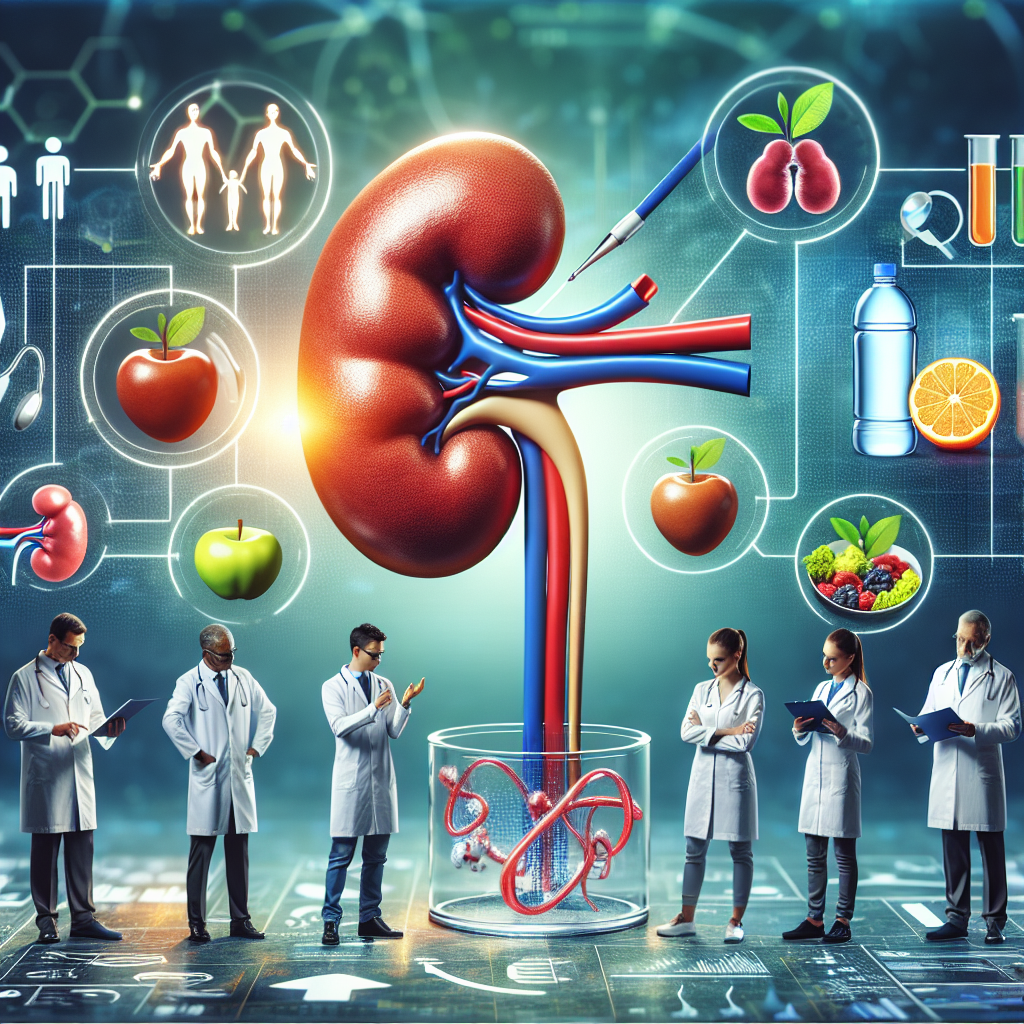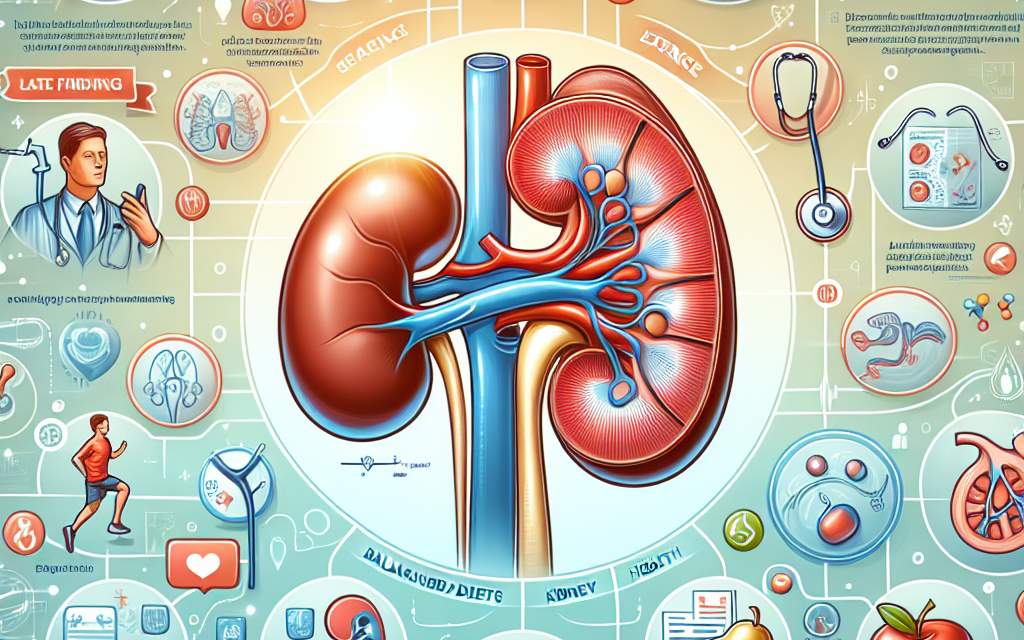Experts Reveal Latest Findings and Tips for Enhancing Kidney Health

The kidneys are vital organs that play a crucial role in maintaining overall health by filtering waste products and excess fluids from the blood. With the increasing prevalence of kidney-related diseases, understanding how to enhance kidney health has become more important than ever. In this article, we delve into the latest findings and expert tips for maintaining optimal kidney function. We explore five key subtopics, each providing detailed insights and practical advice.
The Importance of Hydration for Kidney Health
Hydration is a fundamental aspect of maintaining kidney health. The kidneys rely on adequate fluid intake to perform their essential functions, including filtering waste and balancing electrolytes. Recent studies have highlighted the significant impact of hydration on kidney function and overall health.
Experts recommend drinking enough water to produce about 1.5 to 2 liters of urine per day. This amount can vary based on individual needs, climate, and physical activity levels. Staying well-hydrated helps prevent kidney stones, urinary tract infections, and chronic kidney disease.
One study published in the Clinical Journal of the American Society of Nephrology found that individuals with higher water intake had a lower risk of developing chronic kidney disease. The study emphasized the importance of maintaining a consistent fluid intake to support kidney function.
- Drinking water is the best way to stay hydrated, but other fluids like herbal teas and clear soups can also contribute to daily fluid intake.
- Avoid excessive consumption of sugary drinks and caffeine, as they can lead to dehydration and strain the kidneys.
- Monitor urine color as an indicator of hydration status; pale yellow urine typically signifies adequate hydration.
Incorporating these hydration tips into daily routines can significantly enhance kidney health and prevent potential complications.
Dietary Choices and Their Impact on Kidney Function
Diet plays a pivotal role in maintaining kidney health. Consuming a balanced diet rich in essential nutrients can help prevent kidney disease and support overall well-being. Recent research has shed light on specific dietary patterns that promote kidney health.
The DASH (Dietary Approaches to Stop Hypertension) diet, originally designed to lower blood pressure, has been shown to benefit kidney health. This diet emphasizes fruits, vegetables, whole grains, lean proteins, and low-fat dairy products while limiting sodium, saturated fats, and added sugars.
A study published in the American Journal of Kidney Diseases found that adherence to the DASH diet was associated with a reduced risk of developing chronic kidney disease. The diet’s emphasis on nutrient-dense foods helps reduce inflammation and oxidative stress, both of which can damage the kidneys.
- Incorporate a variety of colorful fruits and vegetables to ensure a wide range of vitamins and minerals.
- Choose lean protein sources such as fish, poultry, beans, and legumes to support kidney function without overloading on protein.
- Limit sodium intake by avoiding processed foods and using herbs and spices for flavoring instead of salt.
By making informed dietary choices, individuals can significantly enhance their kidney health and reduce the risk of kidney-related diseases.
The Role of Exercise in Supporting Kidney Health
Regular physical activity is essential for maintaining overall health, including kidney function. Exercise helps control weight, reduce blood pressure, and improve cardiovascular health, all of which are crucial for preventing kidney disease.
Recent studies have highlighted the positive impact of exercise on kidney health. A study published in the Journal of the American Society of Nephrology found that individuals who engaged in regular physical activity had a lower risk of developing chronic kidney disease. Exercise helps improve blood flow to the kidneys, enhancing their ability to filter waste and maintain electrolyte balance.
Experts recommend incorporating a mix of aerobic and strength-training exercises into weekly routines. Activities such as walking, cycling, swimming, and yoga can be beneficial for kidney health.
- Aim for at least 150 minutes of moderate-intensity aerobic exercise per week, as recommended by health organizations.
- Include strength-training exercises at least two days a week to build muscle and support metabolic health.
- Stay active throughout the day by taking short walks, using stairs, and engaging in household chores.
By prioritizing regular exercise, individuals can enhance their kidney health and reduce the risk of kidney-related complications.
Managing Blood Pressure and Blood Sugar Levels
High blood pressure and diabetes are leading causes of kidney disease. Managing these conditions is crucial for maintaining kidney health and preventing further damage. Recent advancements in medical research have provided valuable insights into effective management strategies.
Controlling blood pressure is essential for protecting the kidneys. High blood pressure can damage blood vessels in the kidneys, impairing their ability to function properly. Lifestyle modifications, such as reducing sodium intake, maintaining a healthy weight, and engaging in regular physical activity, can help manage blood pressure levels.
For individuals with diabetes, managing blood sugar levels is critical for preventing kidney damage. The American Diabetes Association recommends regular monitoring of blood glucose levels, adhering to a balanced diet, and taking prescribed medications as directed.
- Monitor blood pressure regularly and consult with healthcare professionals for personalized management plans.
- Adopt a heart-healthy diet that includes whole grains, lean proteins, and healthy fats to support blood pressure and blood sugar control.
- Engage in stress-reducing activities such as meditation, deep breathing exercises, and mindfulness practices.
By effectively managing blood pressure and blood sugar levels, individuals can protect their kidneys and reduce the risk of kidney disease progression.
The Impact of Smoking and Alcohol on Kidney Health
Smoking and excessive alcohol consumption are detrimental to kidney health. Both habits can lead to kidney damage and increase the risk of developing kidney disease. Understanding the impact of these lifestyle choices is crucial for making informed decisions about kidney health.
Smoking is a significant risk factor for kidney disease. It reduces blood flow to the kidneys, impairs their function, and increases the risk of developing chronic kidney disease. Quitting smoking is one of the most effective ways to protect kidney health and improve overall well-being.
Excessive alcohol consumption can also harm the kidneys. Alcohol is a diuretic, leading to dehydration and straining the kidneys. Chronic alcohol use can result in kidney damage and increase the risk of kidney disease.
- Seek support from healthcare professionals or smoking cessation programs to quit smoking and improve kidney health.
- Limit alcohol intake to moderate levels, as defined by health organizations, to reduce the risk of kidney damage.
- Stay informed about the potential risks associated with smoking and alcohol consumption to make healthier lifestyle choices.
By avoiding smoking and moderating alcohol consumption, individuals can significantly enhance their kidney health and reduce the risk of kidney-related complications.
Conclusion
Enhancing kidney health is a multifaceted approach that involves making informed lifestyle choices and staying proactive about overall well-being. By prioritizing hydration, adopting a balanced diet, engaging in regular exercise, managing blood pressure and blood sugar levels, and avoiding harmful habits like smoking and excessive alcohol consumption, individuals can significantly improve their kidney health. These expert-recommended strategies not only support kidney function but also contribute to overall health and longevity. By implementing these tips, individuals can take charge of their kidney health and reduce the risk of kidney-related diseases.





